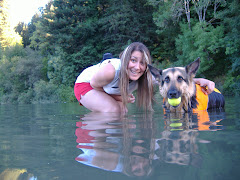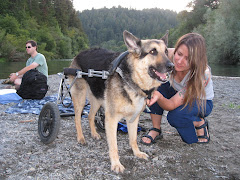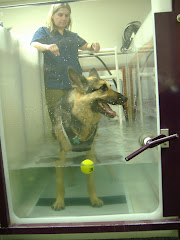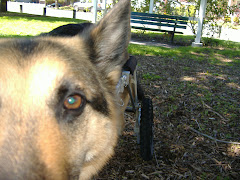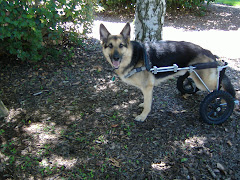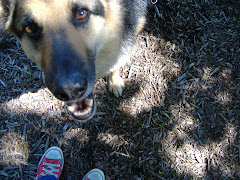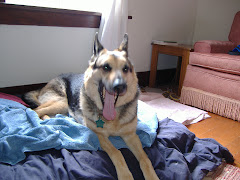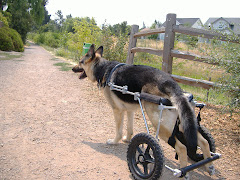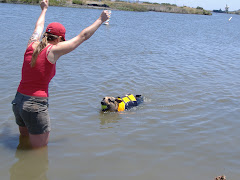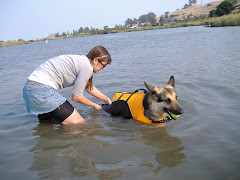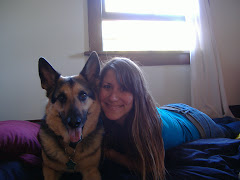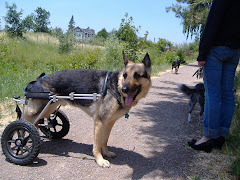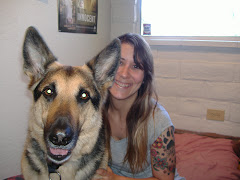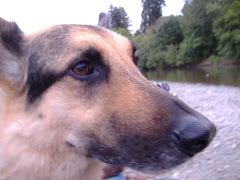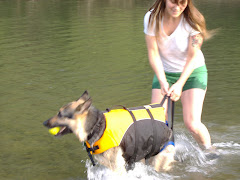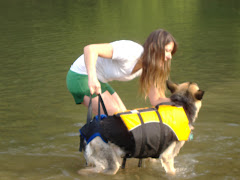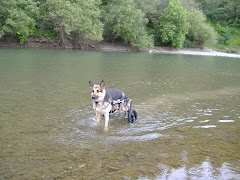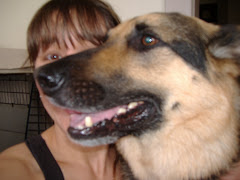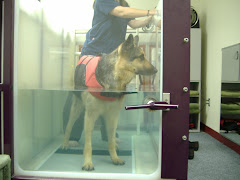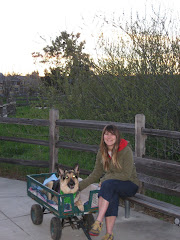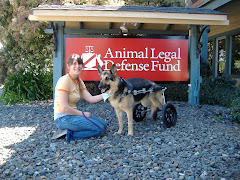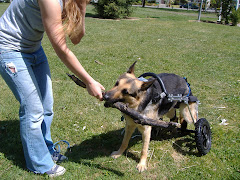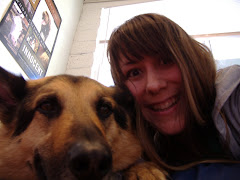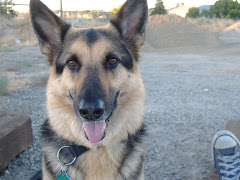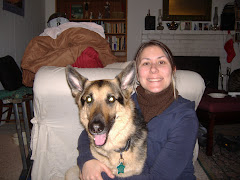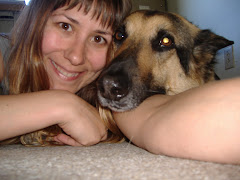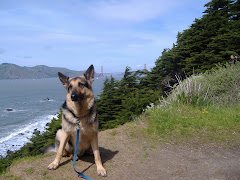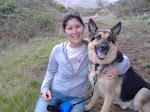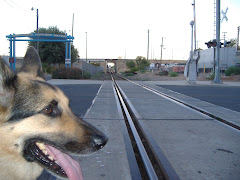I celebrated Alec's 9th birthday yesterday! And yes, there was dog-friendly cake (it was more like a big cupcake). Alec had a great day: swimming at a new indoor facility (more on that soon!), special homemade treats, and his first trip to a nearby park. The best thing (as is the case every single day) was spending time together. That might sound corny, but what dogs enjoy most in the world, once their basic needs are met, is spending time with their human (wish I could tell that to every selfish ignorant jerk who leaves their dog tied up outside all day)...it just so happens that my favorite thing in the world is spending time with Alec. So it works out perfectly. :) You can see the rest of the birthday pictures here.
Sunday, October 11, 2009
Happy 9th Birthday, Alec!
Sunday, September 20, 2009
What wheelchair?
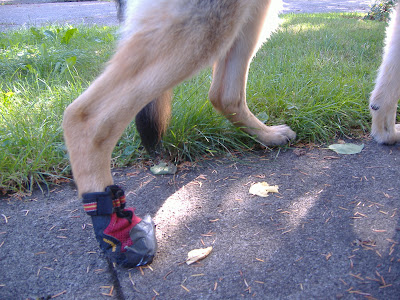
He is still not allowed to run or get rambunctious on land (it is a balance with which I continually struggle – letting him be a dog and not being overprotective, yet remaining cautious and mindful to prevent further injury), but he loves to chase the ball in the water and this summer has been a blessing. I have taken him swimming in the rivers around Portland at least once, and often multiple times, a week. This is the #1 reason I am sad to see this summer slip away. I took him swimming once per week last winter but it was so cold he could only swim for about 20 minutes, whereas this summer he has been able to swim for unlimited amounts of time. There is an indoor warm water swimming facility in Vancouver, Wash., about 30 miles from Portland, called Unsinkable Dogs that I am going to look into for when the weather turns cold. The tanks look pretty small in the photos on their website, so I’m not sure if he will have room to chase the ball, but I will give it a try. I hate to see his happy days in the water come to an end. Maybe we need to move somewhere with an all-year-around warm climate – just so he can swim everyday! In all seriousness, I probably would move us somewhere warmer if I could - preferably near a pristine river or lake with a flat sandy bank - but alas, my job is here. And I suppose there are colder places than Portland, though it didn't feel that way last winter!
A word about serendipity… back in June, Alec developed pressure sores from the cart that became infected. It happened really quickly, like overnight. At this point he was still using his wheelchair for longer walks and I was also taking him for short round-the-blocks about once per day. But due to this skin infection the vet told me I should keep him out of the cart for a couple weeks to allow his skin to heal. When I heard this, I was crestfallen. Would he get enough exercise without being able to use the cart? He was barely walking around the block at that point. Well, those weeks were a turning point, and the infection was a blessing in disguise, because by the end of those weeks, I realized he didn’t really need the cart anymore! He was able to walk longer and longer and seemed to be getting sufficient exercise from walking on his own, and he has only used it once since then. While it was always my goal for him to make the transition to exclusively walking on his own, and this is what we were working toward, being forced to keep him out of the cart for a period of time certainly expedited the revelation that it was possible and he was ready.
I have mentioned the steady barrage of comments (some nice, some rude, most harmless but annoying) I have gotten since being out in public with a big dog in a wheelchair, but I must say there is one comment I never get tired of hearing, and that’s when people see us walking in the neighborhood now and stop to ask (usually after studying us inquisitively for a moment), “Is that the dog that used to have the wheels?” And I happily reply, "Yes, it is! He is walking now." How I beam when I say that. The words feel so good in my mouth and I can hardly contain my joy. Yes, he’s the dog who used to have the wheels… the dog who doesn’t need them anymore.
*** Some people have left comments here about their own dogs having similar issues with paralysis, or grappling with canine physical therapy, and I would be happy to talk you about anything related to my experience with Alec. Please feel free to email me at nrpallotta at gmail dot com. I realize that Alec and I are extremely fortunate, but I also know that time and regular physical therapy can do amazing things, so don’t give up!
Saturday, July 4, 2009
Conditional.
 One of my pet peeves, so to speak, is the concept of “unconditional love” as attributed to dogs by humans. It is a popular way of romanticizing dogs and while I am loath to be the Grinch who stole unconditional love, there are reasons why I think this “compliment” is over- and misused in the context of human-dog relations.
One of my pet peeves, so to speak, is the concept of “unconditional love” as attributed to dogs by humans. It is a popular way of romanticizing dogs and while I am loath to be the Grinch who stole unconditional love, there are reasons why I think this “compliment” is over- and misused in the context of human-dog relations.
I first began thinking about the concept of unconditional love after my beloved husky, Kobi, passed away a few years ago. Did Kobi love me unconditionally? Hell, no! But I loved him unconditionally, and this unique feeling, awakened by my relationship with him (which had many challenges), became a cause for serious reflection. At the time I did not question whether other people were correct to wax poetic about how unconditionally their dogs loved them. I just thought I had that certain odd dog: independent of spirit and in no way loyal, a wild-at-heart canine who felt the confines of living within human society more so than the more slavish breeds (or mixes thereof). That was my dear Kobi, whom I always imagined thought of me as being the “food-lady” and “walk-lady,” and not much more. Moreover, I remember with chagrin times when I would cry bitter tears over yet another mess created or willful act of destruction and wonder why Kobi did in fact not love me, perhaps even disliked me! I ruefully laugh about this now, as being the expression of human narcissism it is, but I’m certain the tacit expectations that accompany the cultural ideal of unconditional love were rattling around in my head. Whatever it was, my dog did not have it for me, which led to feelings of inadequacy, which, well… you see where putting unrealistic expectations on dogs can lead! The desire for unconditional love is a human desire, and many mistakes begin when humans look to dogs to fulfill their psychological and emotional needs.
But I digress. The point being that after Kobi passed, I marveled at how fiercely I loved him for all those years in the absence of practically any positive reinforcement on his behalf, and I thought that was a pretty neat capacity we humans have, and wondered why this might not be the more lofty potential result of genuinely sharing our lives with a dog – this awakening in us, as opposed to elevating and celebrating their so-called capacity to love us “no matter what.”
However, that’s as far as I took this train of thought, as it applied to one particular dog, my Kobi. Only later did I start to think critically about this concept broadly as it is so often applied to the idealized human-dog relationship. If I were so inclined, I could tell myself Alec loves me unconditionally. As opposed to Kobi, he very reliably responds to his name and comes when I call him, and seems to enjoy spending time with me, and never tries to run away from me when off leash. He displays a genuine preference to be at my side rather than elsewhere. Unlike aloof Kobi, Alec gets visibly excited when I come home, whether we have been apart for five minutes or five hours, and seems overjoyed to see me. Yet, does this mean he loves me unconditionally?
Leaving aside questions of whether and what kind of emotions nonhuman animals experience (the plethora of rich studies coming out of the field of cognitive ethology on a regular basis would leave a skeptic hard-pressed to argue that animals do not have complex emotional lives; how similar these emotions are to ours is an interesting question, but also a potential minefield for misplaced anthropomorphism [note that I am also critical of the term “anthropomorphism,” but that is a topic for another day]), let’s take a critical look at the idea of unconditional love as humans apply it to dogs in American culture.
There are a few problems with this concept; perhaps most importantly, it rather conveniently ignores power dynamics. Dogs in American culture are utterly dependent upon their owners (despite the increasing popularity of the term “guardian” among animal protection advocates, we are in reality their “owners” and this is an important distinction under the law) for everything, from the bare necessities like food, water and shelter, to higher order social and psychological needs like companionship, exercise, and mental stimulation. In this way, they are similar to children, who don’t have much of a choice about loving their parents for the simple fact that until a certain age, their parents constitute their whole world. It is well-known that children continue to love parents who abuse and neglect them just as children love parents who provide a loving and secure environment. Unconditional love takes on a twisted and tragic meaning in this and similar contexts, but at root are the powerlessness of the one who supposedly loves unconditionally and the privileged position of the one who is the recipient of this fabled “love without strings.” In a relationship where one party has all the power, it is facile and self-serving to suppose that the powerless one loves the “master” unconditionally. This facet of the dominant ideology serves to legitimize and mask power relations inherent in the dog-human relationship. For, despite the fact that more people define their pets as “family members” in surveys, the sad fact is that this is very much a provisional status, which can be (and all too often is) terminated at will by the member of the relationship who is not legally defined as property, and therefore has the absolute authority to do the defining (and subsequent re-defining).
We live in a country in which countless healthy dogs are relinquished to shelters each year (approximately half of whom are killed) for reasons that range from trivial and entirely fixable behavioral problems, to not wanting to put in the time and effort to find a home that will accept pets, to simply not having enough time to spend with the one-time “family member.” If this is unconditional love, I’d hate to imagine what the conditions would be! I cannot say if all of the people who give up their dogs each year for lifestyle reasons in happier times claimed their pet loved them unconditionally, but it’s a fair bet in a society in which this is a prominent, if contradictory, cultural belief.
What got me started thinking about this most recently was an ad I saw on the Portland Craigslist. I never go on the “pets” section of CL, but I was looking for something specific and while there I was surprised and depressed to see all the “free to good home” ads (surprised because for some reason I thought CL disallowed this type of listing, but apparently they only prohibit sales of animals). Out of curiosity, I clicked on a listing that advertised a free pair of Weimaraners. The ad showed a picture of two dogs, a mother and son, and contained a story about how the owner had fallen on rough times during the recent “economic storm” and could no longer keep these cherished family members. After a few paragraphs detailing the charms of the breed and of these two dogs in particular, the person giving her dogs away had the gall to list as a requirement that the new owner love them “unconditionally.” Holy shit – are you kidding me?
The above scenario, and the countless others like it, exemplifies the other reason why this concept, beautiful and poetic though it may be, is problematic: “unconditional” is an adjective describing a verb: love. Yes, love is in the end a verb, an action, or it is meaningless. This applies to human–human relationships too. But many dog owners treat it as something squishy, just a feeling that can come and go and be transferred to the next owner. No matter how well-intended, this exalted term has been bled of meaning, dubious in its application from the first. The fact that someone would have the lack of self-awareness to demand that the new owner of the dogs she herself is giving away love them unconditionally is revealing. In a society where dogs are legally defined as property, a status reflecting the dominant social values already in place, unconditional love is a fiction, something which can be given and taken away at the whim of the more powerful, in other words, the antithesis of unconditional.
So to quote that old jazz standard, down with (unconditional) love! Let’s be more truthful. At its barest, dog’s love for humans is need-based and human’s love for dogs is capricious and non-binding. While my love for Alec does not fall into this latter camp, nor does it describe the feelings of many of my friends for their dogs, our commitment to our canine charges does not reflect the dominant order. I most assuredly do love Alec unconditionally and I daresay it is the most powerful, beautiful force that exists – a primary force giving rise to other secondary emotions and actions. But I resent this concept being co-opted to the point where a person giving her dogs away on Craigslist can invoke it with straight face and lack of embarrassment at her own hypocrisy. If I sound angry, it’s because I am. It saddens me deeply to know that erstwhile canine “family members” are being put to death in “shelters” every day. Calling attention to the cultural myths that help enable this shameful situation may be akin to shouting into a hurricane, but how long will we as a society, as individuals, allow this to continue?
In the end, whether dogs love us unconditionally is to me the less interesting question than are we capable of loving them this way? And perhaps we need to ask ourselves: why do we need them to love us unconditionally? What hole in our psyches does this fill? What is this deep rooted desire to be loved for simply existing? Dogs are not tools that exist to pump up our egos; I would propose we instead endeavor to earn their love by doing our best to fulfill their species-specific needs. I believe this challenge – and it is an ongoing challenge – is the essence of unconditional love.
PS Alec continues to do amazingly well and the Portland move has been good to us. More updates soon!
Saturday, March 21, 2009
One Year Later...
 This time last year, Alec was one month out of surgery and had just returned for his first recheck exam with the neurologist. Based on his persistent lack of deep pain sensation, she told me (as any neurologist would have) that he “had a poor prognosis for return to normal function.” In other words, chances were slim that Alec would ever walk again.
This time last year, Alec was one month out of surgery and had just returned for his first recheck exam with the neurologist. Based on his persistent lack of deep pain sensation, she told me (as any neurologist would have) that he “had a poor prognosis for return to normal function.” In other words, chances were slim that Alec would ever walk again.
At this point, we had moved into a vacant office on the first floor of ALDF headquarters in Sonoma County, Calif. Because Alec had come out of surgery for a herniated disc paralyzed, I could not take him home to our house in San Francisco, which had become inaccessible due to the stairs. We had nowhere to go. That’s how we ended up living in my office. I was sleeping on an air mattress next to Ali’s bed, eating microwave dinners, showering in the sink, and relying on my friends to take garbage bags full of laundry home every couple of days for me (Alec could not control his bladder or bowels and we went through towels, blankets, and sheets at mind boggling speeds). It seemed I did not leave his side for weeks, except to scurry to the bathroom.
I don’t think I registered the stress because there was no room for it. If you have ever been in a similarly stressful situation you will know what I mean. I proceeded hour by hour, minute by minute, doing the best I could with very little information, none of it especially good or encouraging. Alec had been hospitalized for two weeks, and I was terrified to bring him home and have the team of vet techs and doctors who were on hand 24/7 at the emergency facility shrink pathetically to just me, who had no idea what she was doing. Alec could not urinate by himself and I had to manually express his bladder several times a day (if done incorrectly, he would quickly develop an infection). I was shown how to do this at the vet hospital a few times and it was clearly difficult even for the professionals. This daunting task was made more difficult by his size. Although bladder expression is much easier when a dog is standing, Alec could not stand up and I was not strong enough to hold him up (at the vet hospital it took three vet techs to accomplish this task – once he was discharged there was only me) so I had to do it with him lying on his side, which is much harder. We went through box after box of piddle pads and diapers, because in between expressing his bladder, he would constantly dribble/leak and soil his bed. His bowels worked without my help but he had no control over them, so he would begin to poop and then try to get away from it but could only drag himself through it, smooshing it into his fur and his bed. I cleaned him and his bed up many times each day.
These first several weeks were difficult for both of us. But there were bright spots: my good fortune to work at an animal protection organization that allowed Ali and me to move into my office temporarily, a group of generous friends who supplied me with meals, laundry service, moral support, and donations of needed supplies, and an amazing local veterinarian who made “house calls” to my office to check on us every few days to make sure I was emptying Alec’s bladder completely and that he had not developed an infection. Oh, and the brightest spot of all – that Ali did not die, which I certainly thought he was going to during the harrowing days between his first and second surgeries (first surgery: 2/9/08; second surgery: 2/13/08). At this point, he was going downhill and nobody could figure out why. As his condition deteriorated, the neurologist speculated the spinal bruising might be moving up his spine (a fatal condition called "ascending myelomalacia"), which would have eventually paralyzed his vital organs, including his lungs. This was the first time she used the word “terminal” and I will never forget that feeling of falling.
As it turned out, the exact same disc that had been operated on mere days before had shattered again, for no apparent reason. Neither this neurologist nor anyone I have talked to since has heard of this happening before. It is a mystery, an apparently rare occurrence. This is why he had the second surgery. The neurologist told me she could operate again but warned me that it might not make any difference at all. and he could come out no better than before the surgery. It was a gamble. But we were out of options at that point so I said, yes, do it... do anything you can.
So Alec did not die and that was the best gift of all. But he was paralyzed. My playful, goofy, beloved shepherd who only a week before was running in the park playing his favorite game, “stick,” could no longer move his hind legs. However, I was told he could use a mobility cart (doggie wheelchair) to get around, even if he never walked again, and I was eager to do whatever it took to help Alec get his life back. Of course, I still hoped he would regain the ability to walk, but that hope became increasingly dim as the days passed and he still did not recover deep pain sensation, which brings us back to that first re-check in March 2008: my hope dissipated further when he was given that poor prognosis.
There is a lot more I could tell, both about those scary/crazy/stressful early days, and about how Alec began to slowly but steadily improve. I am going to skip over everything that has happened in the last year because much of our rehabilitation journey has been chronicled in this blog. I wanted to write this one-year anniversary post to emphasize how far Alec has come in the last 12 months. Because all you really need to know is that in early Feb. 2008 a disc suddenly shattered in Alec's spine and he became paraplegic. He could not walk, could not control his bladder or bowels, and was expected to be paralyzed for the rest of his life. But he is walking now. Yes, walking…first with a lurch, now with a limp. Last month, he walked around the block without his wheels for the first time and we haven’t looked back. I am gradually increasing his time outside of his cart and he is doing great.
Let me just say it one more time, because it feels so damn good to write this: ALEC IS WALKING. Sometimes it’s hard for me to believe, just like it is hard for me to remember how I groped my way through those first few days and weeks without the panic swallowing me. Alec has defied all expectations. He is amazing. And hey, I am not going to sing my own praises here, but I did not give up on him either, which was also important. I gave him every chance and he took it, from one milestone to the next. Some people have wondered what his attitude was like when he came out of surgery paralyzed. I want to write more about this issue in another post, but I will tell you, Alec means the world to me, and I watched him closely for signs of depression. While there were of course changes and adjustments, Alec always had a good attitude. Honestly, his resilience and irrepressible spirit astonished me. His great attitude continues to this day, and has helped with his physical therapy and everything else we have been through on this road to recovery. Which by the way is not over…but I am happy to report that perhaps the biggest milestone of all has been reached. One year later, my boy is walking again.
Tuesday, February 17, 2009
Dr Carol Helfer of Canine Peak Performance took this little video of Ali last week during his weekly underwater treadmill session. This day marked the one-year anniversary of Ali's second spinal surgery. To think about how far he has come in the past year...truly amazing.
Thursday, February 12, 2009
Your dog or your bicycle?
I had the strangest argument with a very good friend of mine the other night after she asserted that a mutual friend’s feelings for his bicycle were the same as my feelings for Alec. If I had just ignored that comment, the argument would never have ensued. But I was honestly shocked to hear this come out of her mouth. Even if she thinks my feelings about Alec are comparable to another friend’s feelings about an inanimate object, the fact that she would not think twice about voicing this opinion to me was definitely weird. Weirder still was the fact that she would not budge one inch from this assertion, even as she apologized for the fact that I took her comment “the wrong way.” As I repeatedly gave her the opportunity to explain what exactly I had gotten wrong or misinterpreted, she simply repeated the same thing using slightly different words. It was surreal.
Let me back up. This friend dearly loves both Ali and me. And we both love her. She is one of my best friends and I respect and admire her greatly. In fact, I had just flown her up from San Francisco so she could stay at my apartment and take care of Ali while I was in Boston last weekend for work. She is one of the few people with whom I fully trust post-injury Ali. The cost of her plane ticket and food for her stay was around $300, a sum I could have easily reached paying a random pet sitter stay at my house for three days, and Ali knows and loves her, so I was amazingly grateful she took those days off work and time out of her busy life to come to Portland to watch him. This is a good friend! And her love for Ali (and her own dog) is unquestionable. So why does she think Ali can be compared to my friend’s bicycle? I’m not sure. The argument was heated and we came to no resolution. She tenaciously defended her position. Now, the bicycle-loving friend in this scenario truly does love his bike. One could even argue it is the center of his life. He has no car and depends on his bike for work. Using a bike as his sole mode of transportation is also a political statement for him, and his bike certainly holds more meaning to him than it would for the average person. No question. One might even say his bike is his friend. And yet… does he really feel about his bike the way I feel about Ali? Is that even possible? A big point in her argument was that the friend in question is about to pay $50 to ship his bike to San Francisco for a 10-day trip rather than ride a borrowed bike. Okay, even if I did want to engage on the level of how “much money you spend on a person or object indicates your feelings for said person or object,” with my ongoing expenses for Ali and the cool 16k in vet bills he racked up in just two weeks last year…well, sadly, I probably do have him beat there too. No matter how important a material object like a bicycle or any other treasured possession is in someone’s life, no matter how much meaning that thing holds for them (and knowing several people who are crazy for their bikes, I understand the point), can this feeling ever truly compare to the emotional bond one feels with a sentient being? Obviously, I think not. The fact this good friend of mine and Ali’s, who is also a wonderful guardian to her own dog, disagreed enough to argue this point until neither of us had any breath left is indicative of just how far from the mainstream my views are regarding my relationship with my dog. (I use the possessive but not to objectify him – I am “his” as much as he is “mine,” in the best sense of those words). So for those of you who understand why I was shocked and offended by her comparing Ali to a bike in this manner, I want to thank you. You are my kindred spirits in a world where animals are not only defined within our antiquated legal system as mere property with no more worth than a chair (and in the case of a shelter dog, definitely worth less than your expensive bicycle), but also are regrettably often conceptualized in similar terms even by those who love them.
Saturday, January 24, 2009
Attack!
I hate to write this because it was mildly traumatic, but if I could ever figure out how to get this blog to come up in search engines more than my handful of friends may come across it, which I would like because 1.) I’d love for people dealing with similar situations – i.e. a suddenly disabled dog – to read Alec’s story (from the beginning when things were so scary, to know things can get a lot better) and know there is hope, and 2.) I hope people who walk around with their dog off-leash may see this and possibly reconsider that choice!
I tried really hard to put myself between Ali and the lunging dog, but if you can picture the Walkabout harness (it is like a pair of pants over his hind legs with handles on top so I can support his back end), I am holding Ali’s hindquarters up by the handles of the harness so am in a very bad position to defend him. My hands are basically tied – one on his leash, the other on his rear harness, all the while trying to keep the other dog away while making sure Ali stays on his feet. God, it was awful! And the dog was not friendly at all; as soon as he reached us he bared his teeth and started snarling and snapping, trying to bite Ali from different angles, lunging like a snake, as I pivoted to keep myself between them. It all happened so fast but it seemed like an eternity before the owner finally got there and pulled the dog off. What was she doing this whole time? Yelling, “Bear! Bear!” to absolutely no avail. The dog did not even glance toward her one time after he saw us and bolted. I have gone over it in my mind and am still not sure how I should have reacted. This type of thing has happened before (although this was one of the top scariest “incidents” because he was in his harness and way more vulnerable than when he is in the cart…and even in his cart he is pretty dang vulnerable considering how easily it can tip over), so I now carry pepper spray when we walk. However, there was no time for the pepper spray, if I even had it on me (I think I actually had left it inside because we were just going out in the yard). Again, we were right in front of my apartment, not even on a walk. So I used my voice to try to scare the dog off, but he did not even hear me. Once they get into that frenzied state, it is pretty much too late. If this were a normal situation, i.e. one where my hands were free and Ali was not wearing a harness, I would have made sure to get between the dogs and I really think this would have been possible because Ali has actually gotten a lot better about this since I have been working with him on our walks to ignore other dogs. The complicating factor was the harness. I feared if I dropped it, Ali would fall over. He is doing great but in a situation like a dog fight, his body is going to contort in ways in should not. So I was not letting go! But that left me with no hands and no leverage. So, the whole thing was basically scary and sucked and then I had to worry that my position as pack leader in Ali’s eyes would be compromised, meaning he will want to take similar situations into his own paws again, and I would not blame him, because dog psychology says your pack leader should defend you and if not, well then you need to step up and take the job. The dog psychology stuff is another discussion, and Ali was not actually bitten by this dog (thank goodness!!), and as Cesar says (I have become quite the Dog Whisperer devotee of late; I think he is awesome), you can’t live in the past but must keep moving forward so I was very conscious not to take that fear with me on out next walk and future outings in our front yard…because Ali will feel my nervous energy, which will only feed his defensiveness around other dogs. So it goes.
The denouement: the woman finally got “Bear” back on his leash and apologized saying “he has never done anything like that before.” – and P.S. this is exactly why you should never have your dog off-leash unless you are in a designated off-leash area (most cities have plenty of these off-leash parks, and that is the place for your experiment, not my street!), because the truth is you simply don’t know how your dog is going to react in all situations – I have seen it over and over and over – unless your dog is under your complete control in public. I have noticed most people erroneously think their dog is under control, until their dog sees something more attractive than staying by their side and bolts away from them, sometimes into the street. It only takes one “mistake” for a dog to get hit by a car and killed. I have seen that happen too. Regarding people misjudging their dog’s temperament, I saw this time and again when I took Ali in his cart to the park in Petaluma. People said their dogs were friendly (which they probably were in most situations) so I let them approach, then they saw Ali’s wheels and tried to attack him because they had a reaction (which of course their owners could not predict) to the strange object – his wheels. Enough times of this and I bought pepper spray and began avoiding other dogs in earnest.
So here is my plea to people who like to stroll around town with their dog off-leash:
Please, please, please obey the laws of common sense and keep your dog on a leash when walking in a public space. There are too many factors at play. Here are four:
1.) Your dog may not be as friendly as you think. Ali and I have gotten run up on by clearly aggressive dogs so many times while their lackadaisical owner yells inconsequentially in the background, “He’s friendly! He’s friendly!” Newsflash: No, he’s not!
2.) Even if s/he is friendly, charging up to another dog (especially one who is on leash) is considered extremely rude in the dog world and will be taken as a challenge by all but the most submissive dogs. In other words, your “friendly” dog can easily trigger a fight with his/her incorrectly socialized behavior. I would be highly alarmed if a stranger of the human kind– no matter how “friendly” they may be – started running toward me while I was walking down the street and then proceeded to grossly invade my personal space. Your strange dog running up to us is no less alarming.
3.) Okay, let’s assume your dog is the friendliest, most mellow fellow in all situations, no exceptions. It actually doesn’t matter because my dog may not be! And that’s okay. Most modern domesticated dogs have one or several behavioral issues, either from irresponsible breeding, an unbalanced upbringing, ongoing unintentional reinforcement of unwanted behaviors by well-meaning but imperfect owners, a history of abuse and/or neglect…and the list goes on and on. There are many reasons why dogs living in human society are often unbalanced. This goes especially for those of us who adopt and rescue dogs with unknown histories, or known troubled histories. But those dogs deserve a chance too, and they have every right to be out enjoying a walk IF – and this is a big, important “if” - their guardian has them under control. Everyone has the right to be out in public without being accosted by a loose dog.
4.) Finally – and to me most importantly – my dog may be recovering from a back injury. Let’s forget for the moment the fact that our dogs may get into a scuffle. Ali is not even allowed to play with other dogs now; it is one of the most risky activities for his back especially since he tends to play rambunctiously. There is no way I can explain this to you in the three seconds it takes your dog to run up to us so please, please please… keep your dog on a leash? Thank you!









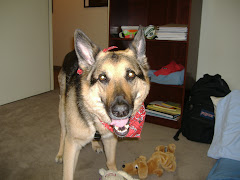

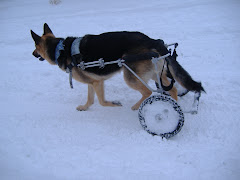
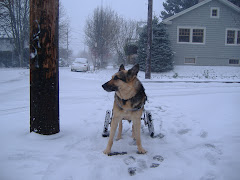
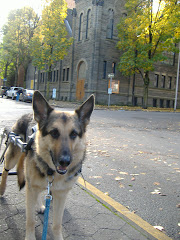
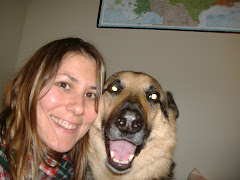
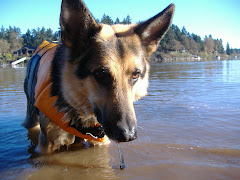
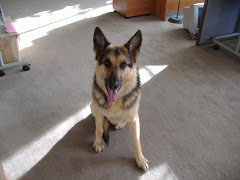
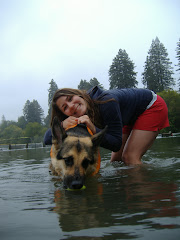_9_19_08+030.jpg)
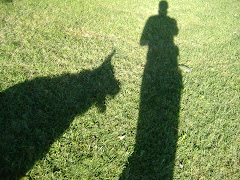
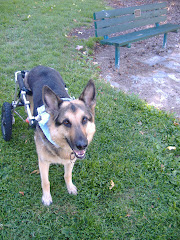
_9_19_08+045.jpg)
_9_19_08+001.jpg)
